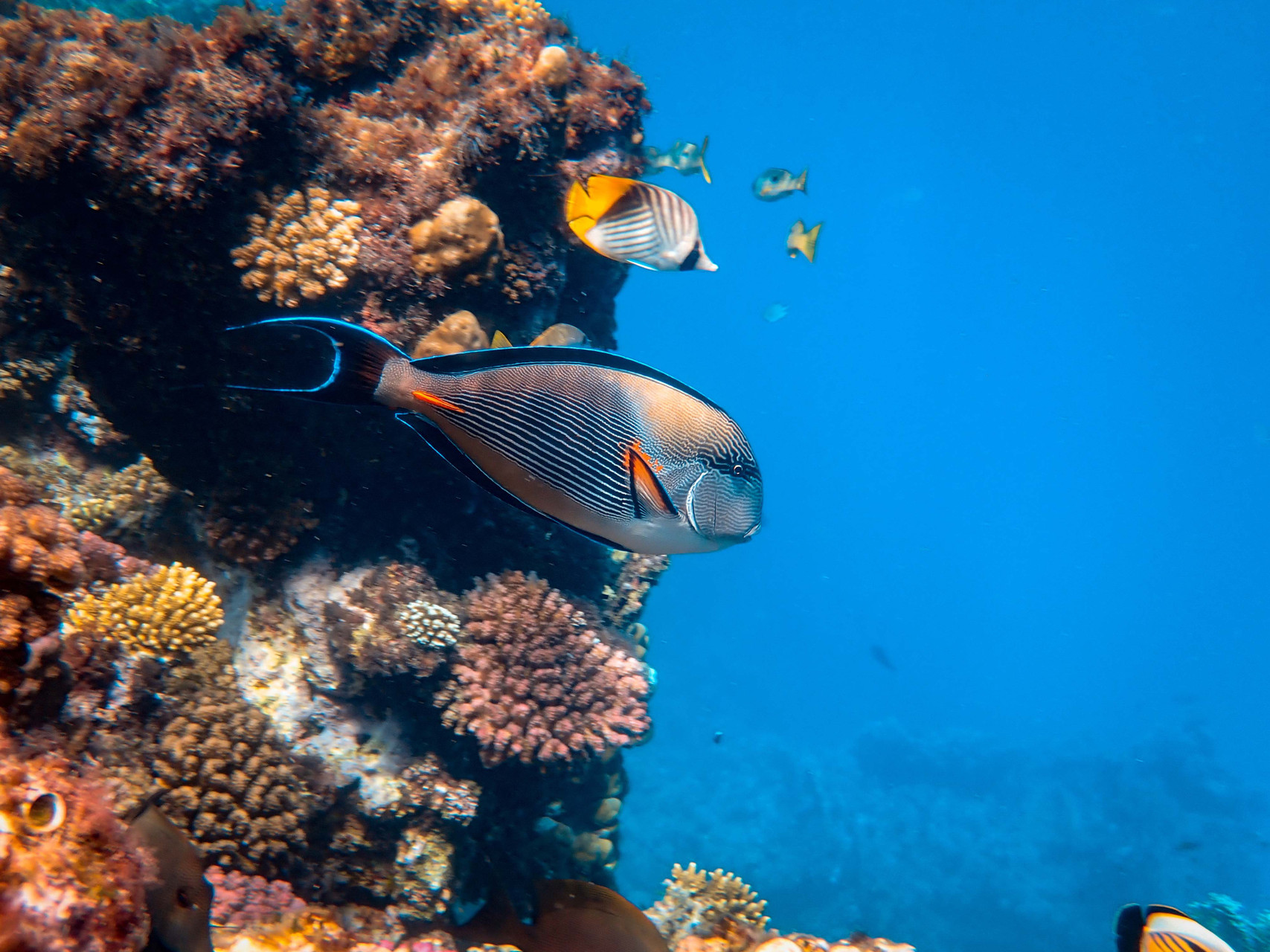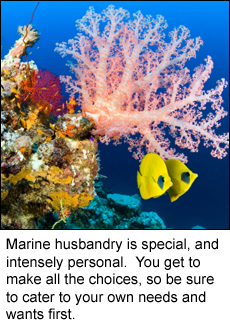Revisited: What's Hot vs. What Your Aquarium Needs

The marine husbandry hobby often presents aquarists with such a plethora of options that it can be impossible finding the right answers to even simple questions. I am sometimes disturbed by the prevalence of competing information, most of which arises from decidedly unscientific experimentation by amateur aquarists. Though the drive to find novel solutions to difficult problems is admirable, the lack of concerted scientific effort handicaps us all when we try to effect real results. Due to my education and experience in biology, ecology, and research, I have a definite tendency to seek out peer-reviewed, vetted data upon which I can base my decisions. The problem with this approach is that there is very little aquarium-specific information being derived by scientists. I am left being forced to trust anecdotal information from other aquarists who, though well-meaning and knowledgeable, rarely produce valid scientific results.

The problems of which I write are exacerbated by the willingness of manufacturers to sell products of questionable utility. These products make claims about what they do and why they are necessary, but rarely provide detailed information about how our livestock are affected. Such products, both new and old, tend to elicit heated debates in aquarium forums, and these debates are an invaluable tool for wading through the mire of facts. Nonetheless, very few of us have the time and resources to design and implement effective experimentation that strictly adheres to the rigorous requirements of scientific literature. Most of the time, we hear about a product, do a little bit of research, and decide whether or not to give it a shot. A little while later we either see the results we think we should or we do not, and then we create a snap judgment based upon what we observe. Sometimes the judgments are valid, other times they are not. However, in the absence of accurate scientific studies, we have only time and personal experience to guide us in our decision making.
The reasons we lack scientific data are complex. It would seem like the wealth of knowledge collected about the marine realm would translate easily into our hobby, but in many cases it does not. For one, the primary motivator for marine research throughout time has been fisheries management. The definition of a fishery is multi-faceted, as it includes both resources being exploited (primarily fish), and those that make a living from so doing. In this manner, the population of an organism, its harvesters, and those who process and sell it are all part of the fishery. The human component cannot be understated in this equation, since anthropogenic considerations are always weighed heavily. Technically speaking, livestock import can also be viewed as a form of fisheries management, but food-related fisheries have always been given a far more important position. As such, much of the science of the ocean has been derived from the study of fish we enjoy eating. Evolution, natural selection, and changing ocean conditions are the other prime movers of scientific research. Issues such as these take up most of the public and non-profit budgets used for researching the marine environment, leaving the private sector to work out the rest.
Without making judgments, we can state that for-profit companies have the primary goal of making money for their investors. It is not surprising then, that research carried out by private companies is conducted with the objective of improving profit margins. The results of studies done under these circumstances are rarely divulged, for fear of providing competitors with proprietary information. While this paradigm has most assuredly provided us with many useful products, there are also many items available which are of no utility whatsoever. In the aquarium industry in particular, there are so many additives, filter materials, foodstuffs, and equipment options, that a trip to the local fish store can be baffling if we are unprepared.
Call me a cynic (or old-school, perhaps), but I just do not think that many of these items are necessary. That is not to say, however, that they are useless or do not do as they are purported. To the contrary, I believe many of them perform exactly as they claimit just seems like many of them seek to make a one- or two-step process into one that takes five- or six-steps to complete. For example, of late I have been researching the so-called KZ, or Korallen Zucht, method of reef-keeping. This type of system has been in use for about a decade, and when properly done provides excellent coloration and growth in Small-Polyped Scleractinian (SPS) corals. Briefly, the gist of this technique is that it uses zeolite stones to facilitate the removal of nitrates and phosphates. Supposedly, dedicated aquarists are able to achieve oligotrophic (ultra-low nutrient) conditions that are conducive to SPS growth. The regular addition of bacterio-plankton further enhances the results when the nutrients are sequestered in bacterial cells consumed by the corals. The unfortunate problem with this method is that it requires extremely labor-intensive husbandry efforts, a vast array of chemical additives, and additional equipment specifically designed for KZ systems. Also, all of the additives and equipment are manufactured by the german company Korallen Zucht, as part of their ZEOvit line of products.
I have no reason to suspect that KZ is anything but a reputable company, and there is enough anecdotal evidence available on the internet to say that this method works exactly as is claimed. In fact, I am heartened to see that someone has gone to such extensive effort to enhance our understanding of aquarium sciences. At the same time, I question the utility of this method for the average aquarist. To start, adding so many extra steps dramatically increases the cost and complexity of our hobby. In the end, we may be better served by spending more of our money on quality livestock and performing regular water changes. Another consideration is livestock selection, as the oligotrophic conditions of a KZ system are not really appropriate for mixed reef tanks. In the end, there may be many people capable of operating a successful KZ system, and it has been demonstrated to work very well when done correctly. I simply chose KZ systems as an example for what is a larger issue in the aquarium industry. There are so many products available to aquarists that it is easy to overlook the fact that the simplest systems often work the best. For most of us, there is no need to go to such great lengths to achieve good results.
The best thing to do is to create a list of priorities. Ask yourself questions like: A) What am I most interested in keeping; B) How much time and money can I afford to spend on my aquarium hobby; and C) Do people achieve comparable results with or without certain products? There are a few simple requirements that will benefit everyone, such as feeding the right foods, operating a protein skimmer, providing ample live rock, and using RO/DI water. Beyond that, pretty much everything is up in the air; the flexibility of the hobby is its greatest asset and its greatest downfall, all at the same time. Right answers are rare, if they exist at all. The utmost satisfaction should come from doing it your own way, and succeeding. Therein lays the vindication for the choices you made. It is a bit like golf; the standard you strive to should be based upon the previous standard you created for yourself, not someone elses. None of us will ever be Tiger Woods (or Julian Sprung), but all of us can get a little better everyday at what we do. As we advance, we will find out more about what we like. As we evolve into better aquarists, we will add complexity to our systems in some ways, and reduce it in others. That is what makes this hobby fantasticthe sky is the limit. KZ systems demonstrate the principle that there will always be another level to which we can elevate. Yet, for the majority of us, we do not need to get there anytime soon.
My intention here is not to single out any one thing as bad, ill-advised, or a waste of time. In fact, if you really have the desire to excel at something specific, are eager to try new things, and have the time and resources to attempt to create a highly-advanced system, why not do it? On the other hand, if you are operating on a financial and temporal budget, I highly suggest using very strict criteria when deciding on an operating regime. Each of us operates a unique system with individualized needs, and we all have differing capabilities. I urge everyone to make aquarium choices based on their own best interests, not according to what is trendy. In the end, this hobby is about personal satisfaction and accomplishment, not competition. The way I look at it, whether you fly a fighter jet or a hang-glider, you are still flying. Either way, there are a lot of other people left on the ground, unable to do the same thing. Find out what works for you and stick to it.
